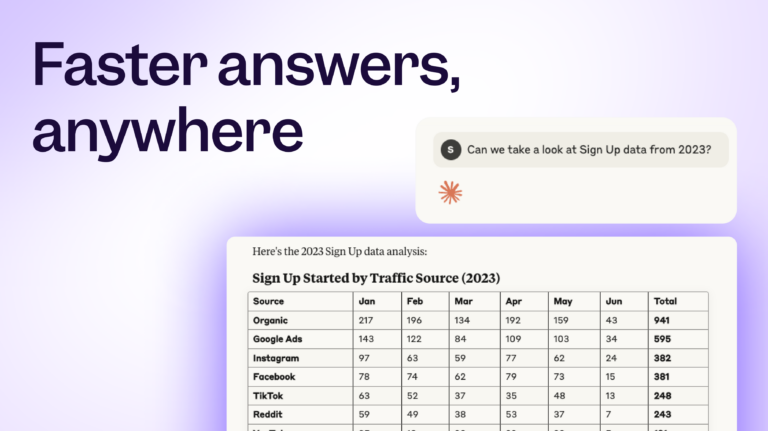Introducing Mixpanel MCP Server: Bringing LLMs to your analytics data
What if you could talk to your data using natural language? Sound too far-fetched? It’s not, as we’re excited to announce the beta launching of our official Mixpanel Model Context Protocol (MCP) server.
With this new capability, you can connect large language models (LLM)—like Claude or Cursor—to Mixpanel and get the answers you need.
What’s an MCP Server?
MCP is a protocol for connecting third-party services such as databases, APIs, etc. to large language models (LLM). Creating an MCP server defines how a client can interact with your service. An MCP client (like Claude Desktop, ChatGPT, and more) connects to the server, and allows an LLM to interact with your service. MCP is rapidly becoming the standard protocol for how LLMs interact with data platforms like Mixpanel.
Our remote MCP server connects your preferred LLM clients directly to your Mixpanel analytics so you can perform tasks like generating reports, understanding your event and property definitions, and comparing insights with other tools in your stack.
Who benefits from the Mixpanel MCP Server?
At its core, the Mixpanel MCP server makes analytics faster, easier, and more accessible for everyone in your organization:
Data Analysts: Reduce repetitive requests, free up time for advanced projects, and extend the reach of your analytics by enabling colleagues to self-serve insights.
Product Managers: Explore user journeys, conversion funnels, and feature adoption, without waiting on analysts or building custom reports.
Non-Technical Teams: Identify drop-off points, compare cohorts, and ask high-level questions using natural language prompts—no dashboards required.
By enabling AI to interface with Mixpanel, it opens new possibilities for teams at every level to turn complex data into simplified, actionable insights.

See Mixpanel MCP in action
Traditionally, getting answers from the analytics data required more technical knowledge and time. With the MCP server, AI handles all of that complexity for you.
In just a few steps, you can easily combine data from different sources and find correlations you might not see otherwise.
Example
Let’s say you have a PDF or Excel file with data about purchases made through your system. Separately in Mixpanel, you have data about the users who made those purchases. With the Mixpanel MCP server, tying those sources together becomes easy. You can ask the AI to pull order events data from Mixpanel and combine it with actual order content, what items were purchased, and how much revenue they generated—without having to understand where the data lives or how to handle it.
Using natural language for queries like these makes the process more accessible and easier to scale, eliminating the learning curve for new team members and democratizing access to your analytics data across the organization—from product managers to marketers to executives.
Leverage Mixpanel MCP Server for digital analytics
Whether you want to dig deeper into funnels, correlate data sources, or make reporting easier for non-technical teammates, Mixpanel MCP server opens up new ways to ask questions about your data and get answers instantly. It’s a step toward making advanced analytics as easy as having a conversation.
And we don’t plan to stop here as we’ll continue to improve and expand our MCP server to help you speed up decision-making, uncover hidden insights, and democratize access to data across their organizations.
Get started today by learning more about how to implement Mixpanel MCP server into your analytics.


